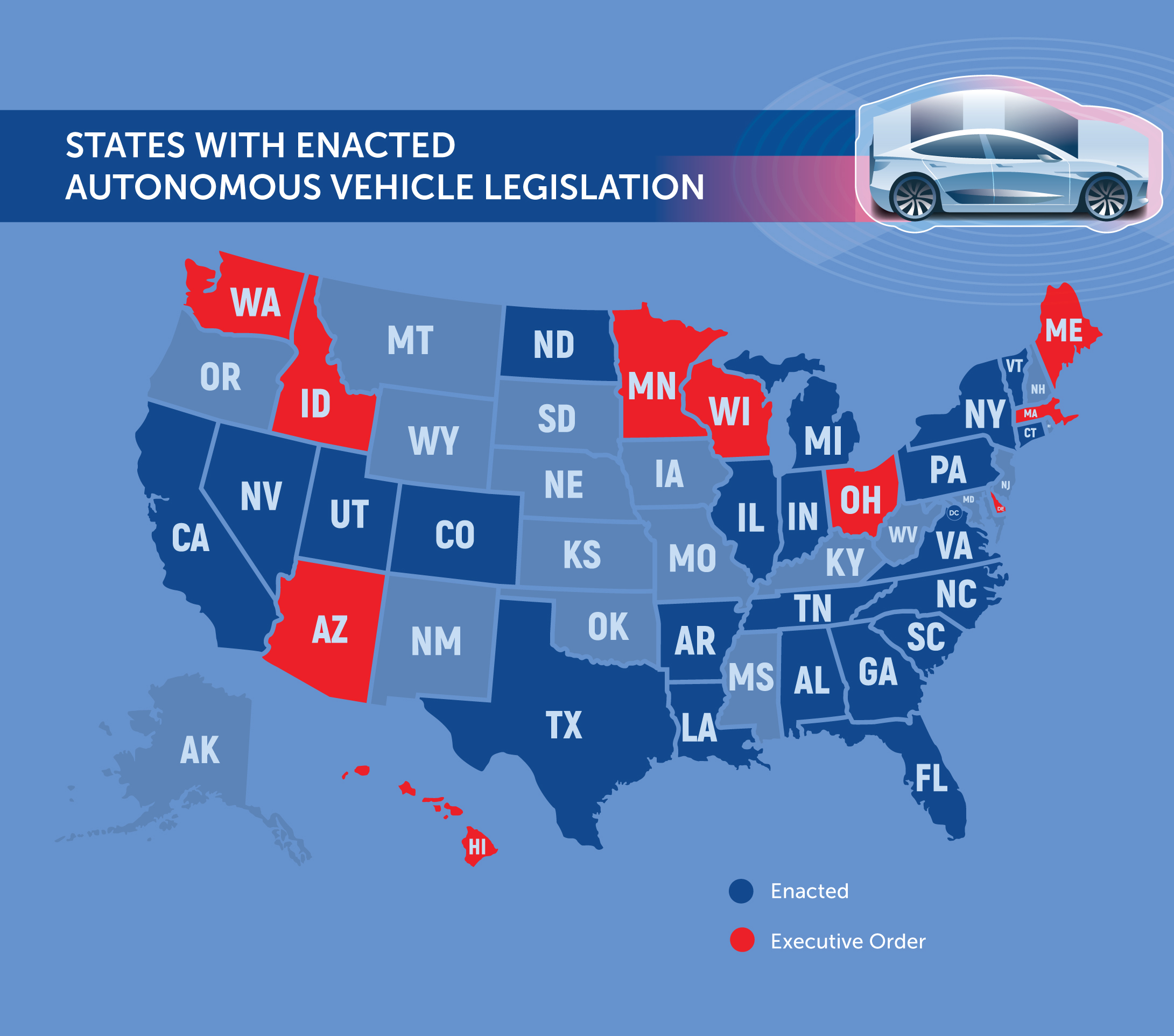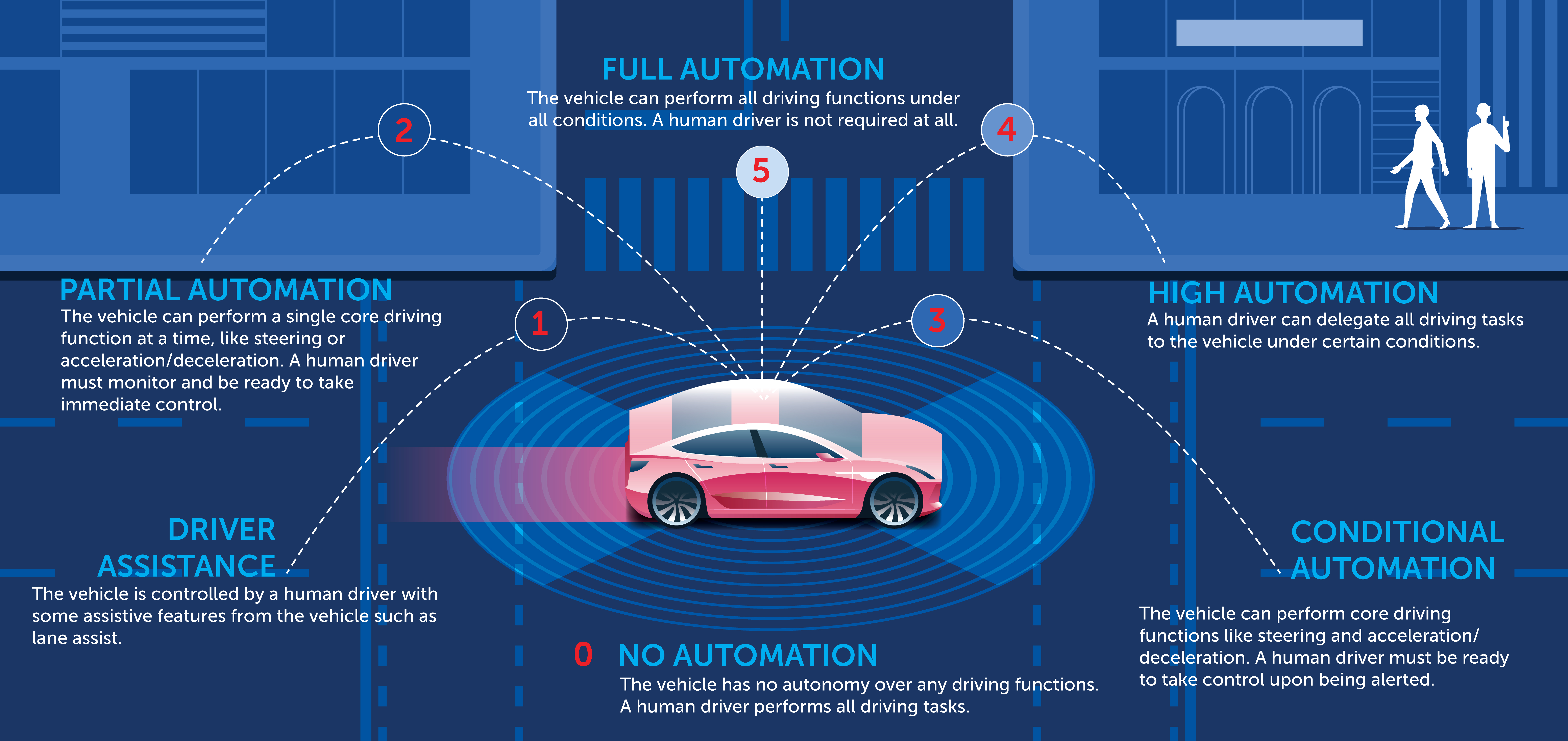
Background
Autonomous vehicles (AVs) use various technologies to read and sense the surrounding environment, enabling the vehicles to navigate without the need for a human driver. While AV technology is still under development and highly-automated AVs are yet to be widespread on roads, the global AV market is expected to grow significantly in the coming years. Proponents assert that AVs are safer than traditional vehicles and will reduce traffi c accidents, the majority of which occur due to human error. In addition to safety, there are potential public health benefits as AVs could reduce environmental impacts and increase productivity, including allowing for more mobility for disabled and elderly populations who cannot operate traditional motor vehicles.State & Federal Regulations
As of 2018, there are no federal regulations for AVs, although the National Highway Traffic Safety Administration (NHTSA) did release Automated Driving Systems: A Vision for Safety in September 2017, which includes voluntary guidelines and technical assistance for states. NHTSA has also developed a five level classification scheme to categorize AVs by level of automation, ranging from Level 0 (no automation), in which a human driver is in complete control of the vehicle, to Level 5 (full automation), in which the vehicle is capable of all driving functions under all circumstances, and a human driver is not required.Congress has not yet passed federal legislation, although the House passed the SELF Drive Act (H.R. 3388) in September 2017 and the Senate introduced the AV Start Act (S. 1885) shortly thereafter. The bills, which would expand federal preemption over motor vehicle safety standards to preempt state regulation of automated driving systems and prohibit states from regulating AV drivers, have since stalled due concerns over safety standards. In the absence of federal regulations, the number of states introducing AV legislation has increased every year since 2012. As of 2018, 29 states have enacted AV legislation. Florida was one of the first states to tackle this issue legislatively, passing a law defining “autonomous technology” and declaring legislative intent to encourage safe development and operation of AV on public roads and to clarify that state law does not prohibit AV technology in vehicles on public roads. The Florida Legislature further addressed AV in 2016, expanding the allowed operation of AV on public roads and eliminating the requirements that a human driver be present in an autonomous vehicle.

Benefits & Risks for Local Governments
While AV technology could deliver many positive outcomes for the public, including decreased traffic accidents and fatalities, and increased mobility for certain populations, challenges exist for policymakers, including local governments. For example, as AVs are increasingly likely to be electric and/or more fuel efficient than traditional vehicles, gas tax revenue will continue to decline. Increased AV technology may also result in lowered local revenues through reduced collection of fees and fines (e.g. vehicle registration, parking fines, traffic citations); however, policies promoted at the state and federal levels tend to promote preemption of local AV regulations, including fees and fines. Additionally, there is a real economic risk associated with job displacement as AV technology increasingly replaces the need for human drivers, as well as potential disparate access to AVs if they are not made available to the public in an affordable way.
Local governments may also need to update road infrastructure to ensure public rights-of-way are compatible with the new technology. In sum, local governments should work with the emerging AV industry and other levels of government to promote policies that balance the potential benefits and risks of AVs. Much of the AV discussion centers on individual vehicles, but there are opportunities for this technology in public transit. The Florida Department of Transportation (FDOT) recently issued an RFP for a consultant to analyze the use of smart technology, including AV, in public transportation systems, and make recommendations for statewide transportation systems. One company, Transdev, has partnered with public transportation entities to launch three autonomous shuttle programs in Florida, including a shuttle running in the Babcock Ranch community in Charlotte County.

